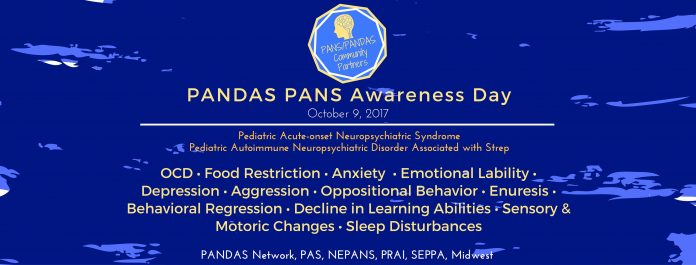by Traci Chapman, staff writer
It’s a disease that affects about one in every 2,000 children, a condition many times overlooked by parents and health professionals – it’s a condition that needs nurses to help shine a light on it and help those afflicted by it.
That’s exactly what the organizers of Oklahoma PANDAS Awareness Days hope will happen.
“I would love for the information about this disease and this event to be spread throughout Oklahoma to our great nurses, so they can take part and can come and learn more about what it means and how many people it affects,” said one of those organizers, Kristen Murdock.
Murdock knows about the condition first-hand, both as an RN and as the mother of an 11-year-old son afflicted with PANDAS – Pediatric Autoimmune Neuropsychiatric Disorders Associated with Streptococcal Infections.
“Our experience is important, not just for us and for other families, but also for my fellow nurses, because it is so debilitating to the children and their families affected, especially when it is misdiagnosed or overlooked,” Murdock said. “It’s up to us – nurses, doctors, other healthcare professionals – to get all the facts and spread the word about PANDAS.
“Children and families are counting on us,” she said.
Spreading the word is the focus of Oklahoma PANDAS Awareness Day, set for 10 a.m. until 1 p.m. Oct. 9 at the State Capitol. The event will feature speakers like Dr. Peter Stanbro, an Edmond psychiatrist who specializes in treating disorders like ADD, post-traumatic stress and autism, and behavioral health providers and other healthcare professionals will also be on hand to answer questions and provide information to both families and nurses and other healthcare providers.
“I consider Dr. Stanbro a PANDAS expert,” Murdock said. “He and the others participating can help and guide families dealing with this issue, as well as nurses and other healthcare professionals looking to learn more about PANDAS and better serve their patients.”
The Murdock family’s experience mirrors that of many others dealing with PANDAS, she said. For years, the family searched for answers to explain their son Ethan’s behavior – the tics, the rages, the mood swings. After being told by pediatricians who didn’t believe PANDAS was a real condition their concerns were invalid, they finally found the key, after a simple blood test revealed its presence.
“That’s what’s frustrating, or one of the frustrating things about this – it only takes a simple, inexpensive blood test to diagnose PANDAS,” Murdock said. “For some children, an intensive or long-term course of antibiotics can send them into remission.”
For Ethan Murdock, a tonsillectomy helped ease his symptoms so much doctors declared he had achieved remission. While the disease is still there and the battle is not yet won, Murdock said the family can now move forward knowing what they are dealing with and with hope Ethan can live without the constant challenges marking so much of his early life.
The problem with PANDAS is it is masked by what doctors might think are other conditions, things like attention deficit disorder, attention deficit hyperactivity disorder or obsessive-compulsive disorder – ADD, ADHD and OCD. Symptoms frequently suddenly appear, or become much worse in a child who already has any of those conditions, following a strep infection, while motor or vocal tics, compulsions or obsessions and rage episodes are also possible results of PANDAS.
While PANDAS strep reactions generally appear in children age 3 to about puberty, adolescents can also be affected, although those incidents are rare, according to U.S. Department of Health and Human Services National Institutes of Health.
PANDAS, while similar to PANS – pediatric acute-onset neuropsychiatric syndrome – is not the same, because children suffering from PANS have had an infectious or other trigger or environmental factor create what NIH officials called a “misdirected immune response results in inflammation on a child’s brain.” PANDAS, on the other hand, is strictly caused by strep infection.
“Learning about this can be particularly important for nurses in pediatric offices or behavioral health – they often spend more time with a child and can observe things parents relate to them,” Murdock said. “So many people have no idea what PANDAS is – including a lot of people in our field.
“I’ve had several of the nurses I know say, ‘What in the world is that – I’ve never heard of it,’” she said. “That tells me it’s important not just to offer information, guidance and comradery to families dealing with this, but also to reach out to everyone in the healthcare field to give them the opportunity to make a difference in the child’s – and their family’s – life.”
For more information about Oklahoma PANDAS Awareness Day, contact Murdock at 405-921-5534 or via email at [email protected].













